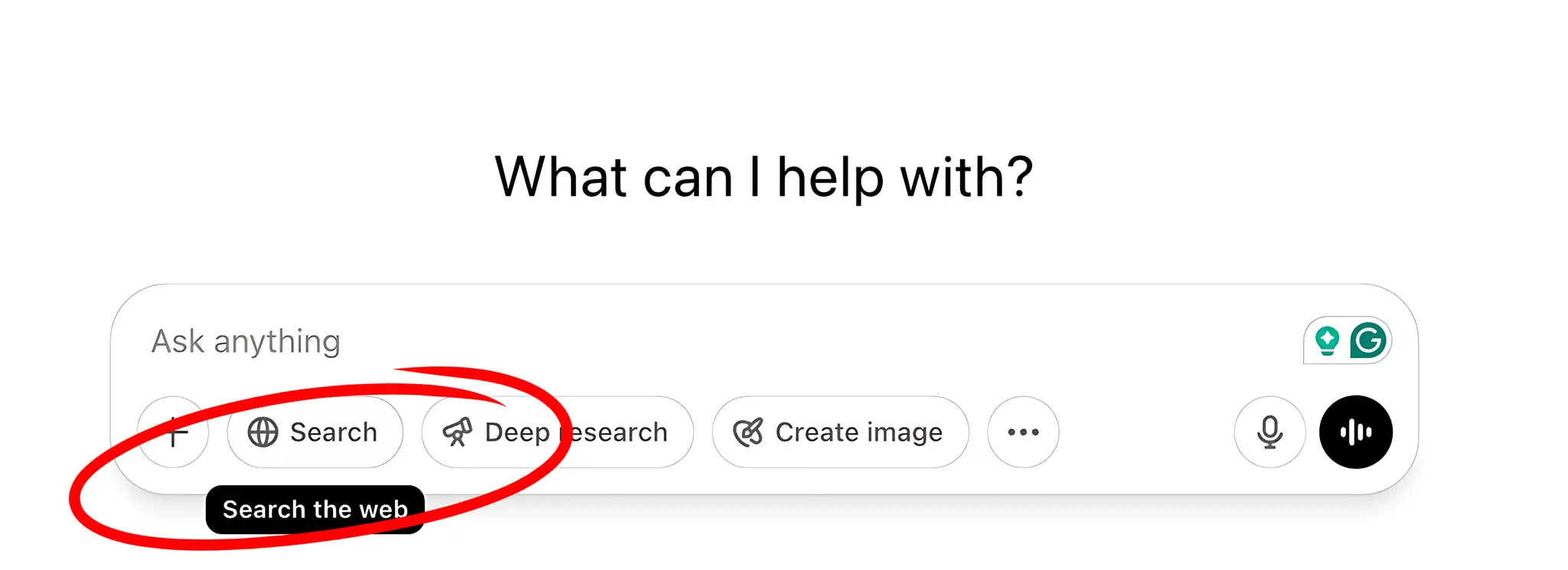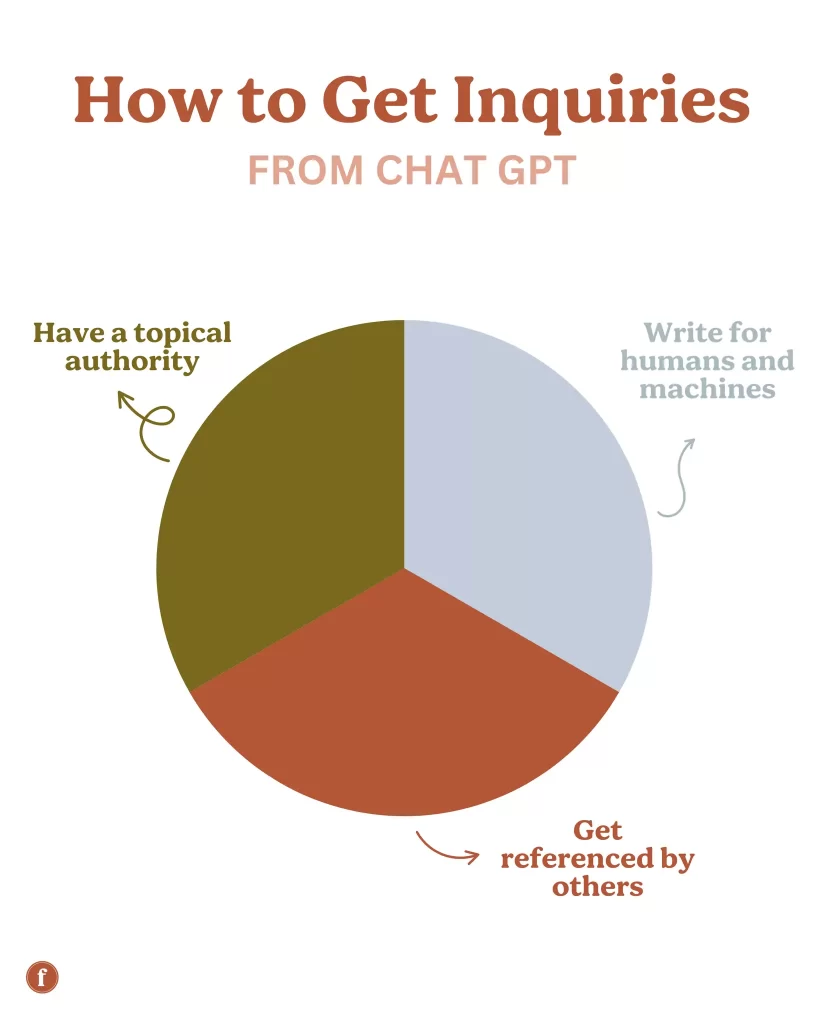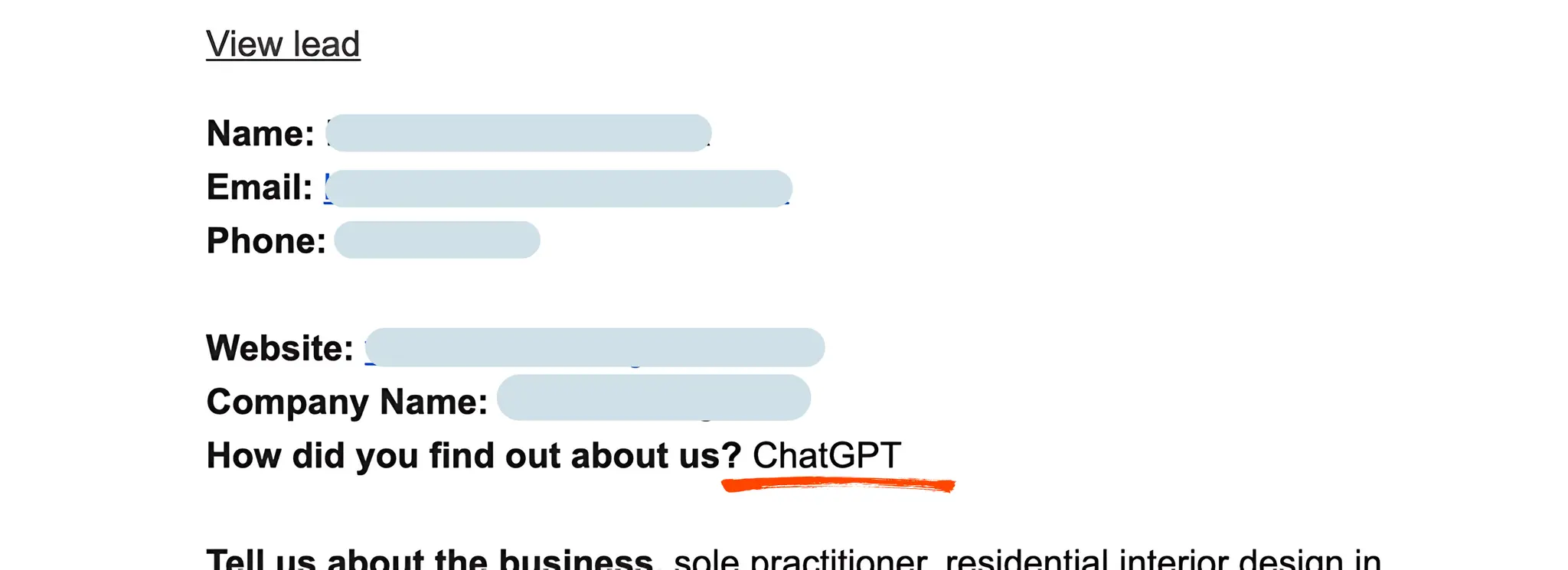Quick Summary
More people are finding businesses through ChatGPT—not Google or social media. But ChatGPT isn’t a search engine; it’s a language model trained on older data and, sometimes, live web content. That means you can’t optimize for it the same way you do for Google. Still, ChatGPT marketing is possible: build a clear niche, get mentioned on reputable sites, and make your content easy for both humans and AI to understand. Most importantly, keep showing up online—and start asking people how they found you. The answers might surprise you.
→ Enjoyed reading this? Join the email newsletter.
Have you had any inquiries from ChatGPT?
An old client of mine just landed a project from someone who found her through ChatGPT.
Not Google, not social media. ChatGPT.
Today, let’s talk about the art and science behind it all.
ChatGPT vs. Search Engines
ChatGPT is not a search engine. It’s a Large Language Model (LLM). It doesn’t crawl or index websites. Instead, it summarizes information based on patterns learned during its training, which ended in mid-2023. If your website didn’t exist before then, it’s probably not in the model.
Search engines (like Google) index and rank websites based on ranking factors. And they do this all day, every day.
ChatGPT only knows what it’s already seen pre-2023.
Except when the search tool is turned on.
Using APIs from Google, Bing, and other search engines, ChatGPT can pull live content not included in its training model. And typically, it prefers to pull content that has been the most cited and recognized across the Internet.
What Does Work
- DO talk about it often. The most loyal and engaged subscribers are typically the ones who’ve already “met” you. They saw you at an event. Heard you on a podcast. Attended your workshop. Or saw one of your reels. When they join your list, they’re not just curious. They’re invested. I suspect these subscribers are so engaged because they can hear you in their heads as they read your emails. They’re pretty much your fans. Your groupies. So next time you speak, teach, or show up online, mention your newsletter. If they like your energy, they’ll likely want to stay connected.
- DO deliver what you promised. If it’s weekly, show up weekly. Don’t flood inboxes or disappear for months. Not cool.

The thing about “optimizing” for ChatGPT
If ChatGPT is mentioning your business, it’s either because …
- Your content was included in its pre-2023 training data
- It’s finding your content online in real time using the search tool
And here’s the bad news: you can’t “optimize” for ChatGPT like you do for Google.
There isn’t a list of ranking factors or a paid ad program. You can’t “apply” to get on ChatGPT, use a special prompt, or even keywords. And while your chats may shape how it responds to you, they don’t influence what other users see. So, if you’re curious whether ChatGPT would list you as the best interior designer in your city, log out before asking. Your own chat history is biased.
In short, we can’t use another “marketing hack” on ChatGPT.
It’s a lot more ambiguous than that.
Bummer, I know.
Three things you can do …
In short, the best way to get your firm on ChatGPT is to be on the Internet as much as possible, for as long as possible.
If you’re a marketer, this is probably disappointing to hear (or maybe relieving, you tell me). I’m basically saying: keep doing what you’re already doing, babe.
If you’re not a marketer, but a designer or builder, this is what I’m talking about:

1. Have a niche (or “topical authority”)
AI likes patterns. When your business has a clear niche, it’s easier for LLMs (like ChatGPT) to identify what you do, associate you with that expertise, and cite you when users ask.
“This site = expert in this space.”
Your niche could be based on location, property type, or design style. Whatever makes your work distinct.
And your niche should be obvious everywhere. Your website. Your portfolio. And every single piece of content you put online.
(Actually, niching down is a best practice in business and marketing. I wrote more about it here and here.)
2. Get referenced by others
The more you’re mentioned online, the more likely AI tools are to recognize and cite you. Especially if the mentions are on trusted, public sites.
So, get featured on high-authority publications, directories, “Top 10” and award lists, as well as podcasts.
Oh! And get lots of online reviews.
3. Write for both humans and machines
Structure your content clearly so both people and AI can understand it.
Use headings, summaries, FAQs and schema markup like Article, FAQ, or LocalBusiness to help both search engines and AI parse your content more effectively.
Don’t forget to measure it
If you’ve been here for a while, I’m in love with tracking sales data. It makes for better marketing, especially in this new era of AI marketing we’re in.
- Add a “How did you hear about us?” field to your contact form, with ChatGPT as an option.
- Tag ChatGPT manually as a referral source in your CRM or Google Analytics.
- And most importantly, ask new leads how they found you. The answers might surprise you.

If all this marketing-mumbo-jumbo sounds daunting to you and makes you feel even more behind, hit reply or book a call. We can help you keep up and stand out.
See you next week?
Daniela
CEO at Findable Digital Marketing
PS. Want me to write more like this? Send in your own question!




